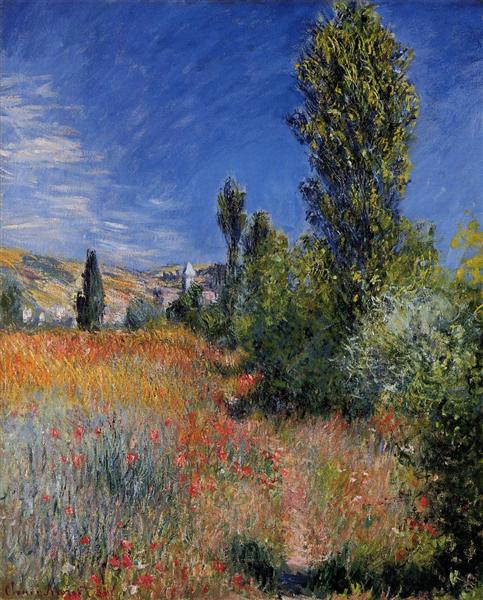Description
Claude Monet’s Landscape on Saint-Martin Island, painted in 1881, is a captivating exploration of light and color, characteristic of the Impressionist style that defined the artist’s career. Capturing a panoramic view of the coastline on one of the Caribbean islands, this painting reveals Monet’s ability to evoke not only a physical landscape, but also the atmosphere and emotion of the moment.
The composition is built on a horizontal axis, where the sea stretches out towards the horizon, occupying a significant part of the canvas. The gentle waves breaking on the shore are depicted with fluid brushstrokes, giving a sense of movement and the ephemeral nature of water. As our eyes slide towards the background, we can see the mountains rising in soft contrast to the sky, reinforcing the depth of the landscape. This choice of composition aims to draw the viewer into the immensity of the surroundings, inviting them to experience the landscape as if they were present.
The use of color in “Landscape on Saint-Martin Island” is masterful, with a palette that abounds in vibrant blues and greens. The application of loose brushstrokes allows the colors to blend across the surface of the canvas, causing a luminous effect that captures the natural light of the scene. The shadows on the water are a darker blue, contrasting with the brightness of the sun reflecting off the surface, while the sky exhibits a range of hues from deep blue to luminous white, mimicking the transience of time that Monet so often sought to capture in his work.
It is worth noting the absence of human figures in this composition, which reinforces the idea that the landscape itself is the true protagonist. This establishes a purer emotional connection between the viewer and the natural scene. Monet, known for his interest in light and its interaction with the elements, has managed to create a painting in which nature is presented in its purest form, as a refuge of peace and tranquillity.
Through this work, Monet demonstrates his mastery in capturing the essence of the Caribbean landscape, a less common theme in his work, which often focuses on the flora and landscapes of his native France. This change of scenery not only reveals his versatility as an artist, but also his desire to explore the beauty of different environments. There is a sincere focus on the immediate experience of scrutinizing nature, which is the cornerstone of Impressionism.
The work was created during a period when Monet was engaged in travelling and exploring new landscapes, which significantly influenced his technique and the progression of his style. The freedom of Monet's brushstroke and his concern for capturing light in the present moment are convincingly reflected here, in this interaction between landscape and viewer, turning a simple depiction of nature into a dynamic and immersive visual experience.
In short, “Landscape on the Island of Saint-Martin” is not only a testament to Monet’s technical ability, but also an artistic statement that invites the viewer to appreciate the beauty of nature in its purest form. The work is a magnificent example of his ability to transform a simple corner of the world into a visual phenomenon that resonates beyond its time. In it, light, color and form intertwine to offer a free and emotive interpretation of the landscape, marking a milestone in the evolution of Impressionist art.
KUADROS ©, a famous painting on your wall.
Hand-made oil painting reproductions, with the quality of professional artists and the distinctive seal of KUADROS ©.
Painting reproduction service with satisfaction guarantee. If you are not completely satisfied with the replica of your painting, we will refund 100% of your money.

